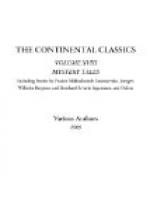I began to be aware of all that had happened here. These two apparently dead men had come back from the cemetery, but how, in what manner, by what means? I don’t understand it perfectly even now. There, in the small room, near to the cemetery, they were living their few remaining days. They did not want to go back again into life.
I shuddered. During these few minutes I seemed to have learned the meaning of life and of death. Now I myself felt that the life of the city was at a vast distance. I had a feeling that the professor was right. It was not worth while. I, too, felt tired, tired of life, like the professor, the feverish, clever, serious old man who came from the coffin and was sitting there in his grave clothes waiting for the final death.
They did not speak a word to each other. They were simply waiting. I did not have power to move away from the crack in the wall through which I saw them.
And now there happened the awful thing that drove me away from our home, never to return.
It was about half-past one when someone tapped on the window. The professor took alarm and looked at Mr. Gardener a warning to take no notice. But the tapping grew louder. The professor got up and went to the window.
He lifted the yellow curtain and looked out into the night. Quickly he returned and spoke to General Gardener, and then both went to the window and spoke with the person who had knocked. After a long conversation they lifted the man through the window.
On this terrible day nothing could happen that would surprise me. I was benumbed. The man who was lifted through the window was clad in white linen to his feet. He was a Hebrew, a poor, thin, weak, pale Hebrew. He wore his white funeral dress. He shivered from cold, trembled, seemed almost unconscious. The professor gave him some wine. The Hebrew stammered:
“Terrible! Oh, horrible!”
I learned from his broken language that he had not been buried yet, like the professor. He had not yet known the smell of the earth. He had come from his bier.
“I was laid out a corpse,” he whimpered. “My God, they would have buried me by to-morrow!”
The professor gave him wine again.
“I saw a light here,” he went on. “I beg you will give me some clothes—some soup, if you please—and I am going back again.” Then he said in German:
“Meine gute, theure Frau! Meine Kinder!” (My good wife, my children.)
He began to weep. The professor’s countenance changed to a devilish expression when he heard this lament. He despised the lamenting Hebrew.
“You are going back?” he thundered. “But you won’t go back! Don’t shame yourself!”
The Hebrew gazed at him stupidly.
“I live in Rottenbiller Street,” he stammered. “My name is Joseph Braun.”
He bit his nails in his nervous agitation. Tears filled his eyes. “Ich muss zu meine Kinder,” he said in German again. (I must go to my children.)




